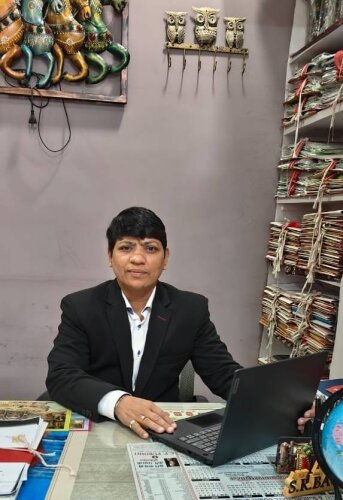Best Juvenile Law Lawyers in Indore
Share your needs with us, get contacted by law firms.
Free. Takes 2 min.
List of the best lawyers in Indore, India
About Juvenile Law in Indore, India
Juvenile law in Indore, India, falls under the broader framework of the national legislation - The Juvenile Justice (Care and Protection) Act of 2015. This Act serves as the principal legislation addressing all issues related to children in conflict with law and children in need of care and protection in India. It primarily centres on the principle of the best interest of the child, and emphasizes rehabilitation and social integration of children.
In Indore and throughout India, individuals under the age of 18 are considered juveniles. Hence, if they are accused of committing a crime, they are subject to this specific branch of law rather than standard criminal proceedings. The purpose of this law is to provide separate and different treatment to juveniles who have committed crimes, focusing more on their rehabilitation rather than punishment.
Why You May Need a Lawyer
If you are a parent or guardian of a juvenile who has been accused of a criminal act, you may need a lawyer to ensure that the rights of the child are protected during the legal proceedings. A lawyer can help navigate the often complex legal process, make sure the child's story is heard and accurately represented, and work to achieve the best possible outcome for the child.
Additionally, you may need a lawyer for non-criminal issues related to juveniles. This might include guardianship issues, custody disputes, adoption procedures, and matters connected to children's rights and welfare.
Local Laws Overview
The local laws related to juvenile justice in Indore are governed by the broader framework of the Juvenile Justice (Care and Protection) Act of 2015. This Act stipulates two main bodies for handling Juvenile Crimes: Juvenile Justice Board (JJB) for children in conflict with the law and Child Welfare Committee (CWC) for children in need of care and protection. The Juvenile Justice Boards determine the proceedings in case a crime has been committed by a juvenile, while the Child Welfare Committees are involved in the welfare, adoption, and rehabilitation of destitute and neglected children.
The Juvenile Justice Act includes provisions for dealing with heinous crimes (crimes for which the minimum punishment under the Indian Penal Code is seven years or more) committed by juveniles above the age of 16. It allows for such juveniles to be tried as an adult after a preliminary inquiry by the Juvenile Justice Board. However, they will not be given capital punishment or life imprisonment without the possibility of release.
Frequently Asked Questions
1. What age is considered a juvenile in Indore, India?
In Indore, like the rest of India, any individual under the age of 18 is considered a juvenile.
2. What are the penalties for juvenile offenses?
The penalties for juvenile offenses can vary depending on the nature of the crime, but typically emphasize rehabilitation over punishment. They can range from counseling and community service to detention in a juvenile home.
3. Can a juvenile be tried as an adult in Indore?
According to the Juvenile Justice Act, juveniles above the age of 16 who have committed a heinous crime (minimum punishment of seven years or more under IPC) can be tried as adults but they will not be given capital punishment or life imprisonment without the possibility of release.
4. What is the purpose of the Juvenile Justice Board?
The Juvenile Justice Board is responsible for conducting inquiries and determining the course of action for children alleged to be in conflict with the law.
5. How does the legal process work for a juvenile offender?
The legal process for juvenile offenders typically involves initial apprehension by police, a preliminary inquiry by the Juvenile Justice Board and then appropriate proceedings based on the nature of the offense.
6. What rights do juveniles have under the law in Indore, India?
Juveniles have the right to be treated with dignity and respect, the right to legal aid, the right to be heard, and the right to rehabilitation and reintegration into society. Their identity is also protected under the law, preventing the publication of any information that might reveal their identity.
7. How are custody battles resolved in juvenile cases?
In case of a divorce or separation, the welfare of the child is of paramount concern. The court or the Child Welfare Committee will assess the circumstances and determine which environment would be in the best interest of the child.
8. How does adoption work under juvenile law in Indore?
The adoption process under the Juvenile Justice Act is overseen by the Child Welfare Committee. The potential adoptive parents must undergo a thorough scrutiny process, and once the adoption is approved, the child is placed under the parents' care with regular follow-ups.
9. How are child labor issues dealt with?
Child labor is illegal in India. The Child Labour (Prohibition and Regulation) Act, 1986, in conjunction with the Juvenile Justice Act, provides for the prohibition and regulation of child labor. Violations of these acts are punishable by law.
10. What role does community service play in the punishment of juvenile offenders?
Community service is often used as a rehabilitative measure for juveniles in conflict with the law. The aim is to make the child understand the impact of their actions on society, improve their social behavior, promote responsibility, and serve as a form of making amends.
Additional Resources
Various government agencies and non-governmental organizations play a role in the enforcement of juvenile law in Indore. The Child Welfare Committee, Juvenile Justice Board, National Commission for Protection of Child Rights (NCPCR), and local Child Protection Units are responsible for the welfare and protection of children. Additionally, several NGOs work tirelessly to protect children's rights and welfare in Indore.
Next Steps
If you or a loved one is in need of legal assistance in the field of juvenile law, the first step is to seek help from a legal professional who specializes in this field. They can guide you through the process, making sure you understand the law, your rights, and the possible outcomes. Additionally, reaching out to relevant government agencies or NGOs might provide further assistance or resources related to your specific situation.
Lawzana helps you find the best lawyers and law firms in Indore through a curated and pre-screened list of qualified legal professionals. Our platform offers rankings and detailed profiles of attorneys and law firms, allowing you to compare based on practice areas, including Juvenile Law, experience, and client feedback.
Each profile includes a description of the firm's areas of practice, client reviews, team members and partners, year of establishment, spoken languages, office locations, contact information, social media presence, and any published articles or resources. Most firms on our platform speak English and are experienced in both local and international legal matters.
Get a quote from top-rated law firms in Indore, India — quickly, securely, and without unnecessary hassle.
Disclaimer:
The information provided on this page is for general informational purposes only and does not constitute legal advice. While we strive to ensure the accuracy and relevance of the content, legal information may change over time, and interpretations of the law can vary. You should always consult with a qualified legal professional for advice specific to your situation.
We disclaim all liability for actions taken or not taken based on the content of this page. If you believe any information is incorrect or outdated, please contact us, and we will review and update it where appropriate.












